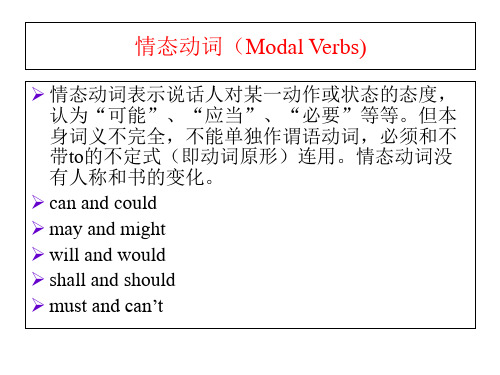初中英语情态动词.ppt
合集下载
情态动词(20张PPT)初中英语专项复习课件

看法。
(1)只作情态动词:must;can/could;may/might;ought to
(2)既可作情态动词又可作实义动词:need,dare
((34))既 具可 有作 情情 态态 动动词词某又些可特作征稿稿定助:定hPa动PPvTP,e词T/海h:量asd素ha材tlo持l;/s续hha更odublde;twteirll/would
【知识拓展】
1. must的一般疑问句,肯定回答为Yes, ...must.;否定回答为No, ...needn’t./No, ...don’t have
to.—Must I clean the classroom now? 我必须现在打扫教室吗?
—Yes, you must. 是的,你必须。/No, you don’t have to. /No, you needn’t. 不,你不必。
He promised he would never smoke again. 他承诺他再也不吸烟了。
Their English teacher would tell them stories in
表示过去反复发生的动 English after class.
作或某种倾向
他们的英语老师总是在课后用英语给他们讲故事
新,上千款模板选择总有一
款适合你
知识点二:情态动词的特点
情态动词的特点: (1)情态动词无人称和数的变化(have to除外); (2)情态动词后接动词原形; (3)情态动词的否定式是在其后加not; have to除外 (4)具有助动词的作用,可用来构成否定句、疑问句及用于简明答语; (5)个别情态动词有现在式和稿过定去PP式T两种形式,过去式用来表达更加客气、委 婉的语气,时态性不强,可稿用定于PPT过,海去量、素材现持在续更或将来。
(1)只作情态动词:must;can/could;may/might;ought to
(2)既可作情态动词又可作实义动词:need,dare
((34))既 具可 有作 情情 态态 动动词词某又些可特作征稿稿定助:定hPa动PPvTP,e词T/海h:量asd素ha材tlo持l;/s续hha更odublde;twteirll/would
【知识拓展】
1. must的一般疑问句,肯定回答为Yes, ...must.;否定回答为No, ...needn’t./No, ...don’t have
to.—Must I clean the classroom now? 我必须现在打扫教室吗?
—Yes, you must. 是的,你必须。/No, you don’t have to. /No, you needn’t. 不,你不必。
He promised he would never smoke again. 他承诺他再也不吸烟了。
Their English teacher would tell them stories in
表示过去反复发生的动 English after class.
作或某种倾向
他们的英语老师总是在课后用英语给他们讲故事
新,上千款模板选择总有一
款适合你
知识点二:情态动词的特点
情态动词的特点: (1)情态动词无人称和数的变化(have to除外); (2)情态动词后接动词原形; (3)情态动词的否定式是在其后加not; have to除外 (4)具有助动词的作用,可用来构成否定句、疑问句及用于简明答语; (5)个别情态动词有现在式和稿过定去PP式T两种形式,过去式用来表达更加客气、委 婉的语气,时态性不强,可稿用定于PPT过,海去量、素材现持在续更或将来。
中考英语复习情态动词课件(共27张PPT).

ought to侧重于表示按照法律,法规等规 定,就强制意义的责任或义务。
should含有个人意见,强调主观看法,语 气比ought to稍弱。
had better
1. It’s raining outside, you’d better stay at home. 2. It’s very cold, you had better not go out.
may表示请求时,肯定回答用may, can;否定回答用mustn’t 或can’t。
二、表示义务类
1. Students must finish their homework before class. 2. I have to go now. 3. Children should learn to respect others. 4. I need type this letter before work. 5. I need to type this letter before work.
must:必须 have to: 不得不 should:应该 need:需要
need 需要(情态动词、实意动词) have to 不得不
三、表示能力类
1. I can draw. = I am able to draw. 2. I could ride a bike when I was six years old.
能,可能,应该, 必须,不得不,需要
最好,将要,可以
must表示肯定是,用于肯定句 can 表示可能,用于否定句,疑问句 may表示可能,用于肯定句
“肯定 是”
“不可 能是”
“可能 是”
对一般现 对现在进 对一般过 对过去进 在推测 行推测 去推测 行推测
情态动词讲解精ppt课件

例句
will/would
详细描述:will 表示现在的意愿或 预测,would 表示过去的或虚拟 的意愿或预测。
1. I will help you with your project.(我会帮助你完成你的项 目。)
总结词:表示意愿或预测
例句
2. They would have gone to the party if they had known about it earlier.(如果他们早点 知道,他们就会去参加聚会。)
表示意愿
情态动词+动词原形,如 would like to go,表示 某人想要去。
形式变化
基本形式
情态动词的基本形式包括 现在时、过去时和将来时 。
过去式
情态动词的过去式通常是 在基本形式后面加-d或ed,如could have done 、should have done等。
将来时
情态动词的将来时通常是 在基本形式后面加-will或shall,如will be able to 、shall have to等。
may与might的区别与联系
总结词
may表示现在的许可或可能性;might表示过去的可能性或许可。
详细描述
may用于肯定句中,表示许可或可能性,例如“You may use this room.”(你可以使用这个房间。 )“The book may be in the library.”(这本书可能在图书馆里。)might表示过去的可能性,常 用于过去时态的句子中,例如“He might come tomorrow.”(他明天可能来。)
未必、很难说
She might not agree with us.
表示虚拟语气
will/would
详细描述:will 表示现在的意愿或 预测,would 表示过去的或虚拟 的意愿或预测。
1. I will help you with your project.(我会帮助你完成你的项 目。)
总结词:表示意愿或预测
例句
2. They would have gone to the party if they had known about it earlier.(如果他们早点 知道,他们就会去参加聚会。)
表示意愿
情态动词+动词原形,如 would like to go,表示 某人想要去。
形式变化
基本形式
情态动词的基本形式包括 现在时、过去时和将来时 。
过去式
情态动词的过去式通常是 在基本形式后面加-d或ed,如could have done 、should have done等。
将来时
情态动词的将来时通常是 在基本形式后面加-will或shall,如will be able to 、shall have to等。
may与might的区别与联系
总结词
may表示现在的许可或可能性;might表示过去的可能性或许可。
详细描述
may用于肯定句中,表示许可或可能性,例如“You may use this room.”(你可以使用这个房间。 )“The book may be in the library.”(这本书可能在图书馆里。)might表示过去的可能性,常 用于过去时态的句子中,例如“He might come tomorrow.”(他明天可能来。)
未必、很难说
She might not agree with us.
表示虚拟语气
情态动词(17张PPT)初中英语专项复习课件

情态动词表推测也是每年中考的重点,以考查can’t 和must为主,主要在单项选择中考查不同情态动词的辨 析。考生在解答此类试题时,可以从以下几方面着手: ①表示否定的推测:一是断然的否定,此类题一般是考 查情态动词表推测的用法,语境会对所填空给出解释, 据 此 可 以 判 断 是 非 常 肯 定 的 否 定 , 此 时 最 好 用 cannot /can’t;二是表示不能十分肯定或拿不准,此类题一般 也会有相关的语境提示,如I’m not sure、who knows等 ,此时最好用may或might。
表示需要、必须,主 要用于否定句和疑问 句中。needn’t常用 于回答must表请求的 否定回答
—Must I finish my homework now?我必 须现在完成我的家庭作 业吗? —No, you needn’t. 不, 你不需要。
注意 (1) must和have/has to均意为“必须”,常可互 换使用。但have/has to是用于强调客观需要,意为 “必须, 不得不”;must用于表示主观看法, 意为“ 必须, 应该”。如:We’ll have to ask Zhang Hong. 我们必须去问张红了。 We must work hard at school. 在学校我们必须 努力学习。
情态动词本身有一定的意义,但不能独立作谓语, 没有人称和数的变化,后面必须接动词原形。常见的情 态动词有:may, must, need, have to 等,具体用法见下表 :
情态动词
用法
例句
表示能力,意为 Sam can speak English well.
can “能,会”
山姆英语讲得很好。
He could have gone home. 他可能已回家了。
表示需要、必须,主 要用于否定句和疑问 句中。needn’t常用 于回答must表请求的 否定回答
—Must I finish my homework now?我必 须现在完成我的家庭作 业吗? —No, you needn’t. 不, 你不需要。
注意 (1) must和have/has to均意为“必须”,常可互 换使用。但have/has to是用于强调客观需要,意为 “必须, 不得不”;must用于表示主观看法, 意为“ 必须, 应该”。如:We’ll have to ask Zhang Hong. 我们必须去问张红了。 We must work hard at school. 在学校我们必须 努力学习。
情态动词本身有一定的意义,但不能独立作谓语, 没有人称和数的变化,后面必须接动词原形。常见的情 态动词有:may, must, need, have to 等,具体用法见下表 :
情态动词
用法
例句
表示能力,意为 Sam can speak English well.
can “能,会”
山姆英语讲得很好。
He could have gone home. 他可能已回家了。
情态动词系动词助动词.ppt

种类
例词
例句
be(是),
表状态的连系 seem(似乎),
动词
keep(保持),
stay(保持)等
look(看起来), feel(感 表示“感觉” 觉起来), smell(闻起
的系动词 来), sound(听起来), taste(尝起来)等
We are in Grade Two this year. 今年我们上二年级。
mustn’t“禁止, 不允许”; can’t“不能”; won’t“不愿
意”; needn’t“不必”。对于must开头的一般问句进行
否定回答, 常用needn’t。所以选D。
二、系动词 连系动词又称系动词, 是表示主语“是什么”或
“怎么样”的词, 它虽有词义, 但不完整, 所以不能单独 作谓语, 必须跟表语一起构成谓语。其分类如下:
The story sounds interesting. 这个故事听 起来很有趣。
种类
例词
例句
表示“变”、 “变成”意义 的系动词
become(变得), get(变 得), grow(渐渐变得), turn(转变)等
He feels sick. His face turns white. 他感到不 舒服, 他的脸色变苍白 了。
long hair. 学生们不应该留长发。
原形(过去式) will(would)
用法
用于第二人称 疑问句中, 表示 征求意见或提
建议
will用于各种人 称, 表示意愿
含 义
例句
Will/Would you please
take out the trash? 你可以把垃圾拿出去吗? 愿意 Your parents will try their
中考英语情态动词复习课件

can could
may might
will would
must have to
need had better should
can ( could ) 能,会 may (might) 可以,可能 will (would) 将,会,愿意 must 必须 have to不得不 need 需要 sb need to do sth ,sth need doing . should应该 had better 最好 had better (not) do sth
-It was great fun .You _C___come.
A must B. can C. should D. may
6.(2006.威海)He needsD____her the truth,
the flowers need_______.
A. to tell, watered. B tell, to water C. tell, watered D to tell ,watering
4.-Must I finish writing the article now ,sir
-No ,you __D__.But you must finish it before
next class.
A mustn’t
B. may not
C can’t
D. needn’t
Thank you for listening!
2.May I take this book out of the reading room
-No, you __C____. You must read it here.
A. may not
B .don’t have to
初中英语语法课件 几种情态动词的基本用法

Need I help you if you get into trouble?
EXERCISES
用适当的情态动词填空
needn’t
1. You
worry about me.
must 2. He looks so pale, he be ill.
3. Plants will die without sunshine.
3.must
表示“必须; 应该” We must finish our homework everyday.
表示“一定”
The book must belong to Jim , there is his name on the cover.
表示“硬要;偏要”
If you must go home, at least call your mom.
7. Students D tell lies. A. may not B. must C. can D. mustn`t
1. You A fail in the exam without hard working. A. will B. would C. mustn‘t D. can
2. He had to give up smoking because of his illness, C he? A. did B. does C. didn’t D. doesn‘t
2. may/might
表示请求、允许、许可, might比may的语气更委婉. 表示推测“可能”, could的可能性比can小。
—May I use the car ? —I’m afraid not. It might not be Jane. She hasn`t dicided to come here yet.
EXERCISES
用适当的情态动词填空
needn’t
1. You
worry about me.
must 2. He looks so pale, he be ill.
3. Plants will die without sunshine.
3.must
表示“必须; 应该” We must finish our homework everyday.
表示“一定”
The book must belong to Jim , there is his name on the cover.
表示“硬要;偏要”
If you must go home, at least call your mom.
7. Students D tell lies. A. may not B. must C. can D. mustn`t
1. You A fail in the exam without hard working. A. will B. would C. mustn‘t D. can
2. He had to give up smoking because of his illness, C he? A. did B. does C. didn’t D. doesn‘t
2. may/might
表示请求、允许、许可, might比may的语气更委婉. 表示推测“可能”, could的可能性比can小。
—May I use the car ? —I’m afraid not. It might not be Jane. She hasn`t dicided to come here yet.
情态动词(12张PPT)初中英语专项复习课件

例句
可能性
The storybook could be Jim’s. He likes reading
小
could 很可能 stories.这本故事书很可能是吉姆的,他喜欢读故
事。
This book must be Lucy’s, for her name is on the must 一定 cover.这本书一定是露西的,因为封面上有她的名 大
态 动
had better 最好,用来提出建议
today.
词
情态动词的基本含义
分析近三年中考真题可知,情态动词的基本用法是中考必考点,考生需 掌握各个情态动词的基本含义(见"考点帮")。
在答题时,应注意结合语境,并考虑常见句型。 常考情态动词有can、may和must及情态动词的否定形式needn’t、
基 本 句
②可能,也许,表示推
They might laugh at me.
型
might 测
情
态 动 词
常 见 情
①必须,表示命令或主观 看法
—Must I finish the homework today? —No, you needn’t/don’t have to. He must be staying here.
基
①能,会,表示能力
I can sing.
本
②可能,表示推测,常用于否定句和疑 Can it be right?
句
问句
型
can ③可以,表示许可和征求对方意见
Can you help me?
情
①能,会,can的过去式,表 I could do it.
态
常
过去的能力
初中情态动词讲解ppt课件

气。 • I want to ask you a question. • =I'd(I would)like to ask you a question. • 我想问你一个问题。 • 3.Would you like~? • 表示请求、劝说,是很客气的说法。 • Would you like a cup of tea? • 您愿意喝杯茶吗?
• b.可能、或许 • (谈论可能性、表示推测,一般用于肯定句)
• Tomorrow I may go shopping. • 明天,我可能(或许)去商店买东西。 • He might be our new teacher. • 他或许是我们的新老师。 • 注意 • might在表示推测时,不表示时态,只是说明可能性比may还要小。
4
must
• a.必须、应该(表示有做某一动作的必要或义务)
• You must buy a ticket. • 你必须买一张票。 • b.一定、准是(表示有把握的判断或推测,一般只用于肯定句中)
• 在You must~.这一句型中,它的意思与祈使句相同。 • You must get up early. =Get up early. • 你必须早起。 • You must study hard. =Study hard. • 你必须用功读书。 • He must be our new teacher. • 他肯定是我们的新老师。 • (语气比may,might要肯定得多)
9
should
• should的用法 • You should read this book. • 你应该读这本书。
• 1.should(应当、应该)用于所有人称,与 ought to~同义。
• You should wait a little more. • =You ought to wait a little more. • 你应该再多等一会儿。
• b.可能、或许 • (谈论可能性、表示推测,一般用于肯定句)
• Tomorrow I may go shopping. • 明天,我可能(或许)去商店买东西。 • He might be our new teacher. • 他或许是我们的新老师。 • 注意 • might在表示推测时,不表示时态,只是说明可能性比may还要小。
4
must
• a.必须、应该(表示有做某一动作的必要或义务)
• You must buy a ticket. • 你必须买一张票。 • b.一定、准是(表示有把握的判断或推测,一般只用于肯定句中)
• 在You must~.这一句型中,它的意思与祈使句相同。 • You must get up early. =Get up early. • 你必须早起。 • You must study hard. =Study hard. • 你必须用功读书。 • He must be our new teacher. • 他肯定是我们的新老师。 • (语气比may,might要肯定得多)
9
should
• should的用法 • You should read this book. • 你应该读这本书。
• 1.should(应当、应该)用于所有人称,与 ought to~同义。
• You should wait a little more. • =You ought to wait a little more. • 你应该再多等一会儿。
情态动词(共43张PPT)

A.Must; mustn't
B.Will; couldn't
C.May; can't
( C ) It's really hot in the room.You'd better
the
windows. A.not to close B.don't close C.not close
(B )
—You
drive after drinking, Simon.
—You're right.I'll take a taxi.
A.wouldn't B.shouldn't C.ought to
二、用恰当的情态动词填空。
Simon, you mmuussttnn''tt play with the knife.You mmayay
在回答以 may 提问的问句时,肯定回答一般可仍用 may 或 Yes, please./Certainly./Sure./Of course.否定回答根据说话人的语气 由强到弱分别选用: mustn't/can't/may not。 —May I watch TV? 我能看电视吗? —No, you mustn't.You must play the piano first.不,你禁止看, 你必须先弹钢琴。
need 的基本用法 意为“需要;必要”,作情态动词时常用于否定句和疑问句中。 You needn't hand in your homework tomorrow.你明天不需要 交你的作业。 Need I attend the meeting this afternoon? 我需要今天下午参 加会议吗?
情态动词 专题课件(共28张PPT)

➢ 5. (may/can) ____c_a_n_____you swim? 表示能力
➢ 6. Listen, please. You (may not/might not)
____m__a_y__n_o_t______ speak during this exam.
表示不允许
may, might, can, could
may, might, can, could
表示猜测
➢ 1. They (can/might) ____m_i_g_h_t___be away for the
weekend but I’m not sure.
表示许可
➢ 2. You (may/might) ___m__a_y____leave now if you
can and could
➢So he can carry heavy books. ➢ability ➢He couldn't open the door by himself. ➢ability ➢Could you open the door, please? ➢request
can and could
表示猜测(不可能)
➢7. They (can not/may not) ___c_a_n_n_o_t_______ still be out, the light is on in the house.
➢8. You (couldn’t/might not) 表示许可
____c_o_u_ld_n_’_t_______ smoke on the bus.
➢9. With luck, tomorrow (can/could) ___c_o_u_ld____be a cooler day. 表示猜测
七年级英语情态动词课件

Policeman Postman
Waiter
Boss
No.1
No.2
No.3
He must be a ….
No.4
Where are they from?
No.1
No.2
No.3
No.4
He/She must be from/come from…
He/She may/might be from/come from…
do be doing have done
What are they doing? … must...
What is Ms Wang doing now?
The ground is wet. What happened last night?
It must have rained last night.
hear nothing. 4. We are students. We __m__u_st____
work hard. 5. ___M_a_y_____ I come in? 6. You __m_u_s_tn_’_t ___ talk in class.
•There must be some mistake. •She can’t be English. •Ask Jim. He may know the answer.
can? may? must? could? might ?Байду номын сангаас
1. Jim ___ca_n_____ sing very well. 2. Hello, c_an_/_c_ou_l_d_/m__ay_ I speak to Jim? 3. He listened, but he ___co_u_l_d____
中考英语语法复习 情态动词的用法课件

shall的用法
shall在陈述句中表示允诺、告诫、威胁、命 令、规定等,主要用于第二、三人称。 You shall suffer for this. (表威胁)
你会为此事吃苦头的。
Tell him that he shall have the book tomorrow. (表允诺).
告诉他这本书明天给他。
could表示过去的能力。
can/could用于疑问句
Can or Could?
__C_a_n__ I go now?
--Yes, you __c_an___
_C_o_u_ld__ I use you phone? --Yes, you ___ca_n__
can 用于疑问句表示请求、征求意见; could 用于疑问句表示更加委婉的语气(非 过去式),回答用can。
will表示意志、愿望和决心。
课程回顾
情态动词萌新三连
我是谁?
表示说话人的 情感和态度
我在哪儿?
动词原形的前 面(情态动词 +do)
我要干嘛?
和动词原形一 起构成谓语。
课程回顾
can/could表示能 力、许可或请求。
may/might表提 出请求、征求意 见。
must/have to表示 必须、不得不。
情态动词萌新三连
我是谁?
表示说话人的 情感和态度
我在哪儿?
动词原形的前 面(情态动词 +do)
我要干嘛?
和动词原形一 起构成谓语。
Jenny
Jenny’s family
这和情态动词有什么关 系呢?
多才多艺的爸爸
Hello, I am Jenny’s dad, I can do a lot of things.
初中英语语法课件 情态动词need

否定句 needn’t+do He needn’t go.他不必走。
肯定句 need+主语+do…? Need he go so soon? 他这么快就要走吗?
need 引导的疑问句,肯定回答要用must。 —Need I hand it in right now? 我需要现在就交吗? —Yes, you must.是的,需要现在交。 —No, you needn’t.不,不需要现在交。
1 . 在 熊 猫 办 公 出 售 的 PPT 模 板是 免 版税 类 (R F : Ro yal ty-F re e )正 版 受《 中 国人 民 共 和国 著 作法 》 和《 世 界版 权 公约 》 的保 护 ,作 品 的 所 有 权 、 版 权 和 著 作权 归 熊猫 办 公所 有 ,您 下 载的 是 PPT 模 板素 材 的使 用 权。 2 . 不 得 将 熊 猫 办 公 的 PPT 模 板、 PPT 素 材 ,本 身 用于 再 出售 , 或者 出 租、 出 借、 转 让、 分 销、 发 布或 者 作为 礼 物供 他 人使 用 ,不 得 转授 权、出卖、转让本协议或者本协议中的权利。
1 . 在 熊 猫 办 公 出 售 的 PPT 模 板是 免 版税 类 (R F : Ro yal ty-F re e )正 版 受《 中 国人 民 共 和国 著 作法 》 和《 世 界版 权 公约 》 的保 护 ,作 品 的 所 有 权 、 版 权 和 著 作权 归 熊猫 办 公所 有 ,您 下 载的 是 PPT 模 板素 材 的使 用 权。 2 . 不 得 将 熊 猫 办 公 的 PPT 模 板、 PPT 素 材 ,本 身 用于 再 出售 , 或者 出 租、 出 借、 转 让、 分 销、 发 布或 者 作为 礼 物供 他 人使 用 ,不 得 转授 权、出卖、转让本协议或者本协议中的权利。
肯定句 need+主语+do…? Need he go so soon? 他这么快就要走吗?
need 引导的疑问句,肯定回答要用must。 —Need I hand it in right now? 我需要现在就交吗? —Yes, you must.是的,需要现在交。 —No, you needn’t.不,不需要现在交。
1 . 在 熊 猫 办 公 出 售 的 PPT 模 板是 免 版税 类 (R F : Ro yal ty-F re e )正 版 受《 中 国人 民 共 和国 著 作法 》 和《 世 界版 权 公约 》 的保 护 ,作 品 的 所 有 权 、 版 权 和 著 作权 归 熊猫 办 公所 有 ,您 下 载的 是 PPT 模 板素 材 的使 用 权。 2 . 不 得 将 熊 猫 办 公 的 PPT 模 板、 PPT 素 材 ,本 身 用于 再 出售 , 或者 出 租、 出 借、 转 让、 分 销、 发 布或 者 作为 礼 物供 他 人使 用 ,不 得 转授 权、出卖、转让本协议或者本协议中的权利。
1 . 在 熊 猫 办 公 出 售 的 PPT 模 板是 免 版税 类 (R F : Ro yal ty-F re e )正 版 受《 中 国人 民 共 和国 著 作法 》 和《 世 界版 权 公约 》 的保 护 ,作 品 的 所 有 权 、 版 权 和 著 作权 归 熊猫 办 公所 有 ,您 下 载的 是 PPT 模 板素 材 的使 用 权。 2 . 不 得 将 熊 猫 办 公 的 PPT 模 板、 PPT 素 材 ,本 身 用于 再 出售 , 或者 出 租、 出 借、 转 让、 分 销、 发 布或 者 作为 礼 物供 他 人使 用 ,不 得 转授 权、出卖、转让本协议或者本协议中的权利。
- 1、下载文档前请自行甄别文档内容的完整性,平台不提供额外的编辑、内容补充、找答案等附加服务。
- 2、"仅部分预览"的文档,不可在线预览部分如存在完整性等问题,可反馈申请退款(可完整预览的文档不适用该条件!)。
- 3、如文档侵犯您的权益,请联系客服反馈,我们会尽快为您处理(人工客服工作时间:9:00-18:30)。
用于肯定句 “可能”
might (可能性更小)
用在肯定句中 “一定”
Guessing game
It’s a he. It’s not very tall. He played as Tang Ren in the movie Detective Chinatown.
Who is this? It ____ca_n_’_t___ be Fan Bingbing. It _m__ay_/_m__ig_h_t_ be Guo jingming. It ___m__u_s_t ___ be Wang Baoqiang.
CONTENTS
一、情态动词的那些事儿 二、情态动词的那些一般用法 三、情态动词的那些推测用法 四、情态动词的那些特殊用法
情态动词的那些事儿
PART ONE
情态动词的那些词儿
may
might
can
couldwຫໍສະໝຸດ llwouldshall
should
must
have to need…
情态动词的那些特点
can could
1.表具备某种能力:能,能够; could (过去的能力) Cinderella could dance well in the past. Cinderella can dance well now.
can could
2. 表请求和允许:“可以”= may; could (委婉语气) 回答:肯定--can 否定--can’t
Cai Xukun can sing songs well. Fan Chengcheng can sing songs well too. But Dong Yanlei can’t sing songs well.
1. 不能单独作谓语,必须与动词原形连用 2. 没有人称和数的变化 3. 有助动词的作用
Practice makes perfect
1. --Must he sing the song in English ? --No, he _____.
A. needn’t B. can’t C. mustn’t
Practice makes perfect
2. --Mum, _____ I visit the science museum tomorrow ? --I’m afraid you_____. It is closed on Monday.
Could I dance with you? Yes, you can.
知识要点总结
情态动词 本意
否定含义
may, might can, could
must
允许
能力, 允许
必须
不可以
不能 不可以
禁止
回答
may/can mustn’t/can’t
can can’t
must needn’t
Practice makes perfect
A. must; mustn’t B. may; can’t C. should; can’t
Practice makes perfect
3. --Mum, _____ I play football this afternoon ? --Sure, but you _____ finish your homework first.
PART TWO
情态动词里的那些一般用法
① may/might ② can/could ③ will/would ④ shall/should ⑤ must/have to/need
may might
意义:请求获得对方的允许,“可以”might (委婉语气)
肯定--may/can
否定--mustn’t/can’t
A. may B. should C. would
Let’s take a break!
PART THERE
情态动词那些推测用法
may (might) can (could) must
0%
can/could
< 50% may/might
<
100%
must
用于疑问句,否定句
“不可能,可能吗”
could (可能性较小;可用于 肯定句,疑问句,否定句)
A. may, could B. can, must C. can, mustn’t D. may, can’t
will would
1. 用于第二人称的疑问句中,表“请求、建议”等; would (委婉)
2. 用于表示意志,意愿或决心,意为“会,愿意”。 will指现在,而would指过去。
Will you marry me?
Yes, I will.
I will love you forever.
shall should
shall 1.征求对方意见,用于第一,第三人称疑问句中
Shall we hold our wedding this Sunday?
Ok.
shall should should 意为:应该。
表达义务,职责(说话人的观点)
Yes, you may. Yes, you can.
May I go to the Ball? No, you mustn’t. No, you can’t.
must
have to
1. 否定mustn’t, “禁止” 2. 否定回答用 needn’t
need
No, you needn’t. No, you don’t have to.
Must I do the housework? Yes, you must.
must
have to
3. must 与have to 的区别
need
I must go to the Ball. But I have to finish the housework, before I go to the Ball.
As human, we should be kind to others.
Practice makes perfect
1. --Many people play with mobile phones all day instead of reading books. --That’s too bad. Everyone _______ be a book lover. Reading is more enjoyable
